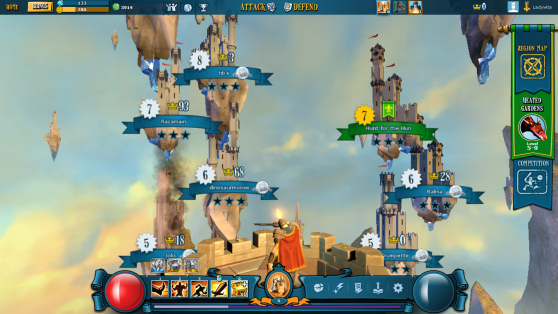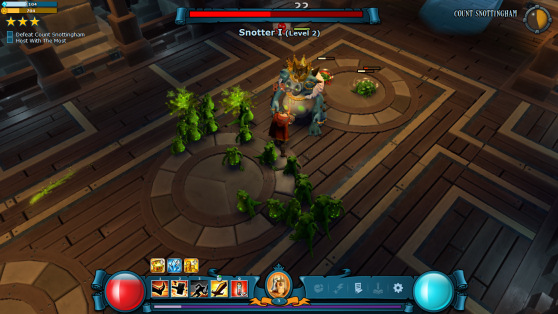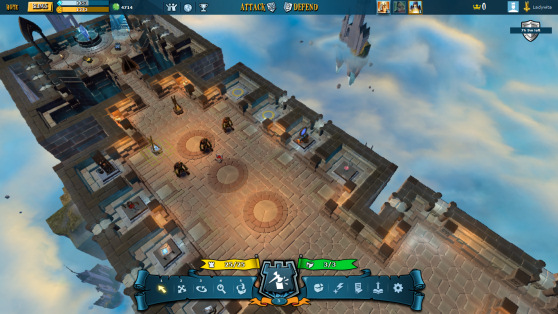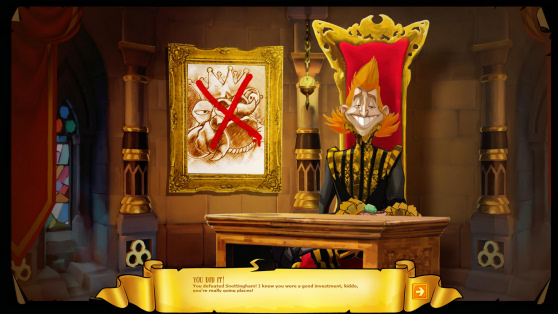The main draw of Ubisoft Montreal’s The Mighty Quest for Epic Loot is deviously clever: The next dungeon you raid may be a player’s, and while you’re busy hauling off the treasure, someone else could be stealing yours.
Well, they’re castles instead of dungeons, but you get the idea. Players build and defend their very own fortress in the sky and plunder other people’s castles — if they can handle the challenge. It’s a constant tug-of-war to see who can not only design an unbeatable castle but also conquer the most.
The Mighty Quest is a free-to-play action-role-playing game mixed with tower defense — only you don’t actively participate in the guarding of your castle. You set up the traps, position the monster minions, and sit back and see who fails to overcome them and who wrecks your best-laid plans.
This is all going on now in closed beta on PC. (The Mighty Quest is expected to launch officially in the fall.)
“The core idea, the one that got everybody excited, is very simple: to have a game in which each player builds his castle and can attack the castle of others,” The Mighty Quest writer Matthew Zagurak told GamesBeat. “With such an concept, online player-versus-player was a natural fit.”
So, how can you be better than the competition? We got the developer to share some insider tips and strategies.
The best of two worlds
If you like action-RPGs like Diablo or Torchlight (which is, like this game, a little cartoony), then you’ll automatically warm up to The Mighty Quest. I even noticed a castle filled entirely with chickens and asked Zagurak whether this was an intentional reference to Diablo III.
“I should lie and say yes, but it is actually just a coincidence,” he said.
The Mighty Quest is an impressive melding of both genres, however. Players must devote their efforts to strengthening their home defenses and also make time to defeat other castles. How much energy you dedicate to each task determines how successful you’ll be, but balancing the two isn’t easy.
“Both are actually as important as you may not have sufficient resources to build your defenses if you never loot other people’s castles,” said Zagurak. “It is the same thing the other way: If a player keeps on looting but does not protect his own loot sufficiently, other players will make sure he or she does not keep it for too long.”
That means focusing equally on offensive and defensive strategies, yet gameplay involves more thought than just charging blindly into castles and dumping minions into whatever available space you might have.
“Building your castle through its layout, its rooms, and traps really is all about expressing your personality in the game,” said Zagurak. “You can have very straightforward, large rooms leading directly to the loot pile — but filled with the biggest, deadliest creatures — but also very twisted, almost maze-like ones constructed with narrow corridors and multiple pathways [that leave] less space for traps and creatures. Some people actually like to create very complex castles that can be extremely tough for the player to go through, ending up on a dead end, as the treasure room was in fact located just near the entrance! It’s really fun to watch and discover how creative our players can be.”
Castle construction and battles are similar to Peter Molyneux’s Dungeon Keeper, but with a key difference. You don’t interact with your minions as they fight. Invasions on your territory and on another player’s are separate affairs.
A real sense of challenge
Depending on what type of hero you pick (you can train more than one), you may find yourself breezing through castles or struggling to stay alive. I viewed this as a refreshing change of pace as many standard action-RPGs quickly shift to autopilot: click, destroy, click, destroy.
“We have some players that still like to specialize their defenses against one type of hero: Knight, Archer, or more recently, Mage,” said Zagurak. “It can then become pretty hard for one of these types of hero to invade the castle, when it could be very easy for the others! Switching between your different heroes may be the final answer when everything else has failed.”
That’s good advice. I found myself falling behind as the Knight, but when I tried out the Mage, I was amazed at how natural the magic user felt to me. Usually I go into dungeon-crawlers with someone who wields a sword because, well, I just like hitting demons and other vile creatures in the face. I tend to avoid magic users because they can be physically weak, but this game offered me a different perspective. I actually liked the Mage — although I noticed very little personality difference between the two classes. (Both seem like jovial partygoers and even sound alike.)
Climbing the ranks
The better you perform in an enemy castle, the better rewards you obtain. That may mean the difference between taking a cut of the treasure at the end or earning stars: one for completing the castle without dying, one for using less than three potions, and one for reaching the final room before the time limit expires. This nets you “crowns” for your efforts.
“You gain crowns when you successfully loot somebody’s castle, and you lose some when somebody loots yours,” said Zagurak. “In the end, it gives players an idea of your level in the game beyond even your hero’s or castle’s level as these are simply increasing steadily as you keep on playing. There is an international leaderboard that ranks people according to their number of crowns, and right now we have a French and an Egyptian player battling for the top!”
If you’re having trouble scoring all three stars, Zagurak recommends experimenting with different tactics. “There are many ways a player can customize his or her hero before attacking a castle,” he said. “Alternating between pieces of gear with different characteristics, changing the special powers selected, and trying different approaches depending on the castle’s layout is a first. Looting other castles to get better gear can be a good idea, too.”
Players can leave messages once they’ve plowed through someone’s castle, which adds some playfulness to the experience. What they write varies, of course. “We have players congratulating others when their castle proved to be a great challenge; others like to give advice on how to enhance their defenses,” said Zagurak. “And, of course, a lot of taunting, which is part of the fun of our game. Nothing’s better than a bit of provocation to have its castle tested and played thoroughly! There is actually a phrase that’s starting to be a recurring gag in-game: ‘Thanks for the crowns.'”
Zagurak said that right now, level caps for heroes and castles are set at 30, “although that will of course evolve in the future.” Castles can contain up to 10 rooms. “As for the crowns, they are not limited by your level or really anything else,” he said. “It only comes down to who the best player is.”
And how willing you are to play on. The Mighty Loot’s concept is almost too clever. What keeps players coming back is a sense of obligation — to mine gold and other goods periodically (or paying currency to finish faster), to improve defenses and monitor whether they’ve lost any treasure, to check their rank, and so on. It’s the same addiction that you might feel with a typical free-to-play game, where you wait so long for an action to complete and return daily to keep everything in tip-top shape.
Only this isn’t your average free-to-play game. It may just be better.
VentureBeat's mission is to be a digital town square for technical decision-makers to gain knowledge about transformative enterprise technology and transact. Learn More




